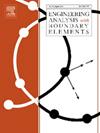一种非迭代无网格的定常和非定常热源识别方法
IF 4.1
2区 工程技术
Q1 ENGINEERING, MULTIDISCIPLINARY
Engineering Analysis with Boundary Elements
Pub Date : 2025-06-05
DOI:10.1016/j.enganabound.2025.106280
引用次数: 0
摘要
本文提出了一种新的非迭代方法来求解一类具有挑战性的偏微分方程——逆热源问题(IHPs)。求解技术采用Pascal多项式在配置框架内求解含未知时变热源、未知空间变热源或未知时空变热源与未知温度场的ihp的数值解。重点是非迭代方法,该方法能够从有限的可用数据中重建未知逆热源和未知逆点热源。对于非定常热源,采用隐式有限差分法对Pascal多项式进行耦合。为了验证该方法,在规则和不规则几何上进行了各种二维基准测试。在某些情况下,也可以使用简单的Tikhonov和基于tsvd的Tikhonov正则化来获得正则化解。提供了使用正则化和不使用正则化的性能比较。对包括点热源在内的规则和不规则几何进行了数值实验,验证了该方法的适用性、准确性、高效性和计算稳定性。本文章由计算机程序翻译,如有差异,请以英文原文为准。
A non-iterative meshless method for heat source identification in steady and unsteady problems
This paper presents a novel non-iterative method for solving a challenging class of partial differential equations (PDEs) named as Inverse Heat Source Problems (IHPs). The solution technique employs Pascal polynomials within a collocation framework to obtain numerical solution of the IHPs containing either unknown time-dependent heat source, unknown space-dependent heat source or unknown space-and-time-dependent heat source alongside unknown temperature field. The main emphasis is on the non-iterative approach, which has the capability to re-construct the unknown inverse heat source and the unknown inverse point heat source from the limited available data. Pascal polynomials are coupled with the implicit finite-difference method in the case of unsteady heat source. To validate the method, various two-dimensional benchmark tests are conducted on regular and irregular geometries. In some cases, regularized solutions are also obtained using simple Tikhonov and TSVD-based Tikhonov regularizations. Performance comparison with and without regularization is provided. Numerical experiments on regular and irregular geometries including point heat source are conducted to demonstrate wider applicability, accuracy, efficiency and computational stability of the proposed method.
求助全文
通过发布文献求助,成功后即可免费获取论文全文。
去求助
来源期刊

Engineering Analysis with Boundary Elements
工程技术-工程:综合
CiteScore
5.50
自引率
18.20%
发文量
368
审稿时长
56 days
期刊介绍:
This journal is specifically dedicated to the dissemination of the latest developments of new engineering analysis techniques using boundary elements and other mesh reduction methods.
Boundary element (BEM) and mesh reduction methods (MRM) are very active areas of research with the techniques being applied to solve increasingly complex problems. The journal stresses the importance of these applications as well as their computational aspects, reliability and robustness.
The main criteria for publication will be the originality of the work being reported, its potential usefulness and applications of the methods to new fields.
In addition to regular issues, the journal publishes a series of special issues dealing with specific areas of current research.
The journal has, for many years, provided a channel of communication between academics and industrial researchers working in mesh reduction methods
Fields Covered:
• Boundary Element Methods (BEM)
• Mesh Reduction Methods (MRM)
• Meshless Methods
• Integral Equations
• Applications of BEM/MRM in Engineering
• Numerical Methods related to BEM/MRM
• Computational Techniques
• Combination of Different Methods
• Advanced Formulations.
 求助内容:
求助内容: 应助结果提醒方式:
应助结果提醒方式:


